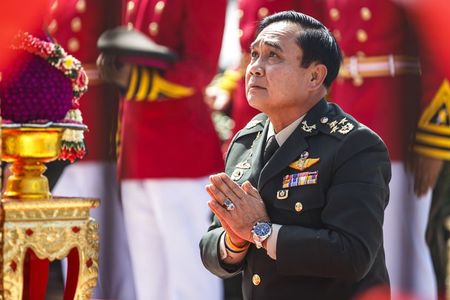By Amy Sawitta Lefevre
BANGKOK (Reuters) - Thailand's army chief prime minister, General Prayuth Chan-ocha, hands over command of the army this week to a trusted ally and steps into civilian politics as head of a government likely to soon face pressure to turn around a sputtering economy.
Prayuth, 60, who led a coup in May, presided over a lavish military parade on Monday marking his retirement as commander in chief of the Royal Thai Army.
Prime Minister Prayuth will remain leader of the junta, the National Council for Peace and Order, and the military's grip on power will remain rigid.
Prayuth's replacement as army chief, General Udomdej Sitabutr, is a close confidante and his appointment signals the dominance of an army faction that both he and Prayuth belong to known as the "Eastern Tigers" - a clique of arch-royalists known for their animosity toward former premier Thaksin Shinawatra.
Nevertheless, Prayuth's mandatory retirement raises the possibility that his influence could begin to ebb, especially if he ever fails to see eye-to-eye with his successor.
"The military clearly retains control but, as a retiree, Prayuth won't have the same chain of command so this changes the dynamics within the junta," said Gothom Arya, a lecturer in peace and human rights studies at Mahidol University.
"As of now there is some semblance of unity within the military but in the past there have been divisions and we may see a loosening of uniformity on some matters that could affect the stability of this government."
Prayuth stood on a podium in uniform to observe a military march past that included tanks, motorcycles and a fly by at a military academy in Nakhon Nayok province, 106 km (66 miles) north of Bangkok.
The straight-talking general, known for his gruff exchanges with reporters, has already taken steps that democracy activists say are aimed at cementing the rule of the Bangkok-based royalist establishment in the face of an unprecedented challenge from the populist Thaksin.
Thailand has been bedevilled by turmoil for much of the last decade as the establishment struggles to retain its supremacy despite repeated election victories by the brash former telecommunications tycoon.
The May coup unseated a government led by Thaksin's sister, Thailand first women prime minister, Yingluck Shinawatra.
SLOW RECOVERY
Prayuth appointed a cabinet this month stacked with military figures and more than half of national legislature members are serving or retired military and police officers.
On Friday, the junta approved a 250-member council to draw up reforms and approve a new constitution, main steps in a plan for a general election late next year. Thaksin's supporters fear the reforms will be aimed at ending his election wins.
But as his political plan unfolds, it is economic problems that might soon be pre-occupying Prayuth.
Exports in August fell by the biggest percentage since serious flooding in late 2011, data on Monday showed, confirming that a key economic engine is not firing.
Exports are equal to more than 60 percent of the Thai economy. On Friday, the central bank scrapped a forecast of 3 percent export growth this year and said it now expects no increase at all.
Anecdotal evidence shows that while exports are sputtering, another key growth engine - domestic consumption - is also not firing smoothly.
While six months of Bangkok street protests ended in May, when the army seized power, consumption was rebounding only modestly, economists say.
"It looks like the recovery is a lot slower than we expected," said Kampom Adireksombat, a senior economist with Tisco Securities.
Economic problems plagued a military government set up after Thaksin was ousted in a 2006 coup, and his allies were able benefit in a 2007 election.

Thaksin, who has lived in self-imposed exile since 2008 to avoid a jail term for graft, has told his supporters to be patient.
(Additional reporting by Juarawee Kittisilpa; Editing by Robert Birsel)
